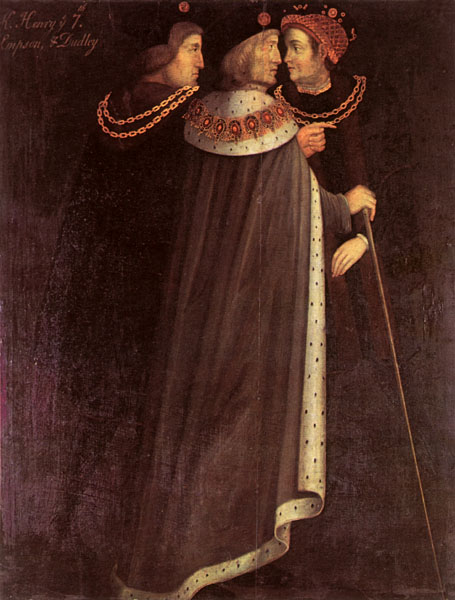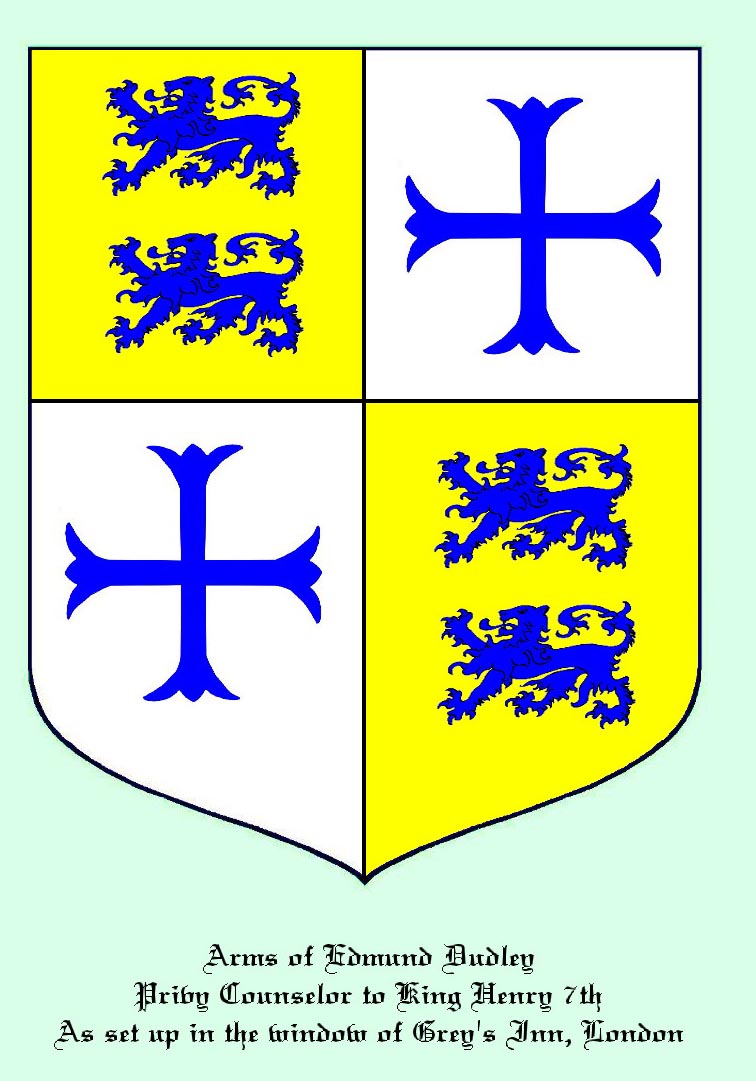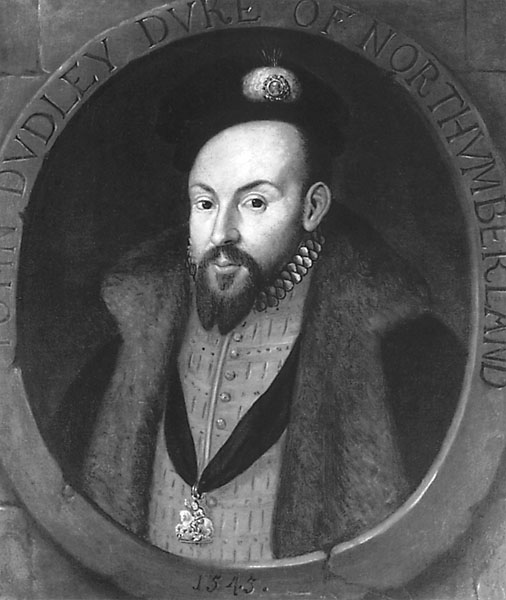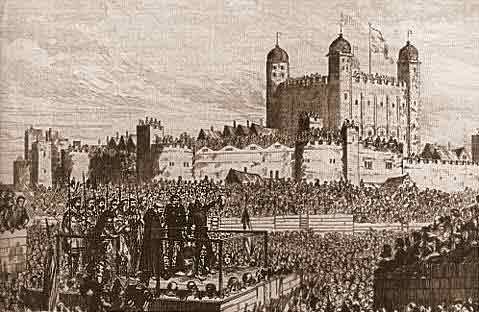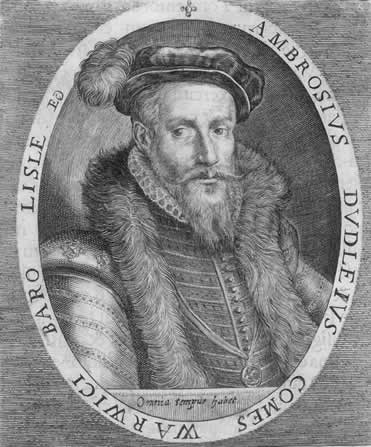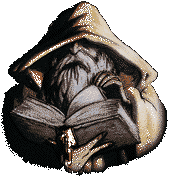|
Edmund and John Dudley Edmund and John Dudley were both in the polictal arena of English History, which in their time was a deadly game, played only by the bravest of men. Your faith was determined, not by the law of the land, but by who was in power at the time, if the king or queen who was on the throne at the time liked you, your head was safe, if not, then to the exicutioners block your head went. Father and son alike met a terrible death, by the exicutioners axe. Read more about these two Dudley's below.
|
|
John Dudley, Duke of Northumberland,
John Dudley was born in 1501. His father, Edmund, was beheaded in the first years of Henry VIII's reign for fraudulent tax collection practices. Dudley and his brother were taken into the home of Sir Richard Guildford. In 1520, Dudley married Guildford's daughter, Jane, and went to Court determined to erase the stigma of his name. Rising by means of his military ability, he became Viscount Lisle, warden of the Scottish Marches of 1542, and after years spent in military service abroad, as lord high admiral in 1543, John was named as one of the executors of Henry VIII's will, he helped Edward Seymour, later duke of Somerset , become protector of the young Edward VI , while he himself was created earl of Warwick and lord high chamberlain, and quickly rose to prominence in the Privy Council. Cooperative and politic, he dissembled his plans for power while distinguishing himself in the field; in 1547 he took part in the victory over the Dudley resented the power of the Protector, Edward Seymour, who isolated the young King by forcing visitors to seek Council approval before receiving an audience. By never actually committing himself and by playing on both Catholic and Protestant sympathies, he finally formed a coalition against Somerset, deposing him in 1549 and having him executed in 1552.
He was made duke of Northumberland in 1551, and now that he was Duke of Northumberland, he abolished the office of Protectorate. He encouraged the King to gain his Majority three years early, being so convinced that he held the boy king in his power. Although many of his fellow councillors resented Dudley's power, Edward VI placed his complete trust in the John. Of little religious conviction himself, he then posed as a firm Protestant to increase his power over Edward VI and to advanced the Reformation for political ends.
His political acumen was acknowledged by his peers--this consisted in his command of the King, with John in actual and absolute control of the state and maintenance of England as an international power, holding the balance between the great empires of France and Spain. Northumberland's technique is best described by Sir Richard Morrison.
To protect and keep the Protestant's power and control over England, and also to protect himself as well, he married his son Guildford Dudley to Lady Jane Grey in 1553, whom he persuaded the king to name as his heir.
On Edward's death Jane was proclaimed queen, but lack of support forced Northumberland's surrender to Princess Mary in Norfolk in July 1553, and was sentenced to be executed. Before Northumberland's death, he did re-profess to the Catholic religion of his youth. He was under a sentence of death, after he was convicted of high treason, and not to be pardoned. John asked for time before execution so that he could reconcile himself to the Catholic faith and his God. This appeal was granted and he was given three days to make his peace with God. His body was doomed; but with his characteristic thoroughness he prepared to save his soul.
A single blow ended John Dudley's life, August 1553.
He is buried in the Tower chapel.
|
|
The Dying Speech of John Dudley, Duke of Northumberland
Mon 23rd Aug 1553, age 51 yrs ! Good people, all you that be here present to see me die. Though my death be odious and horrible to the flesh, yet I pray you judge the best in god's works, for he doth all for the best. And as for me, I am a wretched sinner, & have deserved to die, and most justly am condemned to die by a law. And yet this act Wherefore I die, was not altogether of me (as it is thought) but I was procured and induced thereunto by others. I was I say induced thereunto by others, howbeit, God forbid that I should name any man unto you, I will name no man unto you, & therefore I beseech you look not for it.
And one thing more good people I have to say unto you, which I am chiefly moved to do for discharge of my conscience, & that is to warn you and exhort you to beware of these seditious preachers, and teachers of new doctrine, which pretend to preach God's word, but in very deed they preach their own fancies, who were never able to explicate themselves, they know not today what they would have tomorrow, there is no stay in their teaching & doctrine, they open the book, but they cannot shut it again. Take heed how you enter into strange opinions or new doctrine, which hath done no small hurt in this realm, and hath justly procured the ire and wrath of god upon us, as well may appear who so list to call to remembrance the manyfold plagues that this realm hath been touched with all since we dissevered ourselves from the catholic church of Christ, and from the doctrine which hath been received by the holy apostles, martyrs, and all saints, and used through all realms christened since Christ.
And I verily believe, that all the plagues that have chanced to this realm of late years since afore the death of king Henry the eight, hath justly fallen upon us, for that we have deuvded ourself from the rest of Christendom whereof we be but as a spark in comparison: Have we not had war, famine, pestilence, the death of our king, rebellion, sedition among ourselves, conspiracies? Have we not had sundry erroneous opinions sprung up among us in this realm, since we have forsaken the unity of the catholic Church? and what other plagues be there that we have not felt?
Look upon your creed, have you not there these words: I believe in the holy ghost, the holy catholic church, the communion of saynctes, which is the universal number of all faithful people, professing Christ, dispersed through the universal world: of which number I trust to be one. I could bring many more things for this purpose, albeit I am unlearned, as all you know, but this shall suffice.
And here I do protest unto you good people, most earnestly, even from the bottom of my heart, that this which I have spoken is of myself, not being required nor moved thereunto by any man, nor for any flattery, or hope of life, and I take witness of my lord of Worcestre here, my old friend and ghostly father, that he found me in this mind and opinion when he came to me: but I have declared this only upon mine own mind and affection, for discharge of my conscience, & for the zeal and love that I bear to my natural country. I could good people rehearse much more even by experience that I have of this evil that is happened to this realm by these occasions, but you know I have another thing to do, whereunto I must prepare me, for the time draweth away.
And now I beseech the Queen's highness to forgive me mine offenses against her majesty, whereof I have a singular hope, forasmuch as she hath already extended her goodness & clemency so far upon me that where as she might forthwith without judgment or any further trial, have put me to most vile & cruel death, by hanging drawing, and quartering, forasmuch as I was in the field in arms against her highness, her majesty nevertheless of her most merciful goodness suffered me to be brought to my judgment, and to have my trial by the law, where I was most justly & worthily condemned. And her highness hath now also extended her mercy and clemency upon me for the manner and kind of my death. And therefore my hope is, that her grace of her goodness will remyt al the rest of her indignation and displeasure towards me, which I beseech you all most heartily to pray for, and that it may please God long to preserve her majesty to reign over you in much honor and felicity. Amen, said the people.
And after he had thus spoken he kneeled down, saying to them that were about: I beseech you all to bear me witness that I die in the true catholic faith, and then said the Psalms of Miserere, and De profundis, and his Pater nostre in Latin, and six of the first verses of the psalm, In te domine sperant ending with this verse, Into thy hands O lord I commend my spirit. And when he had thus finished his prayers, the executioner asked him forgiveness, to whom he said: I forgive you with all my heart, and do thy part without fear. And bowing toward the block he said, I have deserved a thousand deaths, and thereupon he made a cross upon the straw, and kissed it, and laid his head upon the block, and so died.
|
|
Ambrose Dudley, 3rd Earl of Warwick
Ambrose Dudley was born about 1528/9 his mother being Jane (née Guildford). As a youth Ambrose was imprisoned with his brothers in the Beauchamp Tower at the Tower of London following the attempt by his father to place Lady Jane Grey (wife of Ambrose's brother, Guilford Dudley, on the throne. After nine months in the Tower with his brothers he was released by Queen Mary I on October 18, 1554 and duly pardoned (22 Jan 1555).
Two years later, in the first month of 1557, when a conflict between France and Spain flared up, Dudley used his influence to raise an army for King Philip II of Spain. He did this in exchange for the return of his family's estates, which had been withdrawn when Northumberland was executed.
Ambrose, Henry and Robert Dudley all joined the forces of Philip II and went to fight in France and took part in the Battle of St. Quentin, where Henry was killed. For these services Dudley, together with his brother Robert and sisters, was restored in blood by an Act of Parliament on March 7, 1558.
With the death of the French King Francis II in 1560, the Franco~Scottish Queen Mary found herself a widow aged 18. The French throne was assumed by the late King’s mother, Catherine de Medici. These ‘bittersweet events’ in Europe confounded English court politics and led to the return of Mary to Scotland, with all its attendant problems for Elizabeth. Whilst in France, Medici was struggling to avert civil war, with the Protestant Huguenots restricted to a limited freedom of worship they were ready to resort to arms to defer total Catholic rule. After lengthy prevarication Elizabeth eventually conceded to pressure from her court to send some six thousand English troops to assist the struggling Huguenots. Ambrose was chosen to lead the expedition.
Ambrose Dudley’s determination that he would retain the town of ‘Newhaven’ against the aggression of the forces of the Duke of Guise, the instigator of the Catholic tyranny, and Uncle of Mary, Queen of Scots, was hampered from the outset by misadventures ranging from the simple lack of troops and finance to a plague that afflicted his armies. When Warwick’s fresh troops were eventually deployed they were prevented from landing in France through sheer bad weather, adverse winds preventing them from entering the Port. Even then, once ashore they too fell to the plague covering France, that was then claiming about sixty of his men each day! Elizabeth finally conceded defeat, not so much on account of the Catholic aggressor as because of the general circumstances and allowed Warwick leave to withdraw. The consequence was that the troops imported the plague into London, where a further 21,000 victims fell ill and died. This affair was a total disaster for Elizabeth and fashioned her future reluctance to engage in ill-affordable foreign conflicts.
In 1564 Ambrose Dudley was created Baron Lisle and Earl of Warwick. He was in high favour with Elizabeth, as was his third wife Anne, daughter of Francis Russell, 2nd Earl of Bedford.
Ambrose was first married to Anne (ne) Whorwood the daughter of William Whorwood, Attorney General and Cassandra (ne) Grey sometime before the 4th of March 1545. Anne died on the 26th of May 1552, at Otford, her home in Kent and bore Ambrose a son they named John in 1550 but who died in 1552. Ambrose recovered from the loss of his first wife and married again to Elizabeth (ne) Talboys (of Kyme) before the 10th of September in 1553. This partnership was followed by a third wedding by his marriage to Anne Russell on the 11th of November 1565, at the Queen's Chapel, Whitehall.
Ambrose Dudley died after having a diseased leg amputated, at Bedford House in the Strand, London. He was apparently re buried on April 9, 1590, in the Lady Chapel of Warwick Collegiate Church.
|
|

Need a Website? We can build you one!
|


